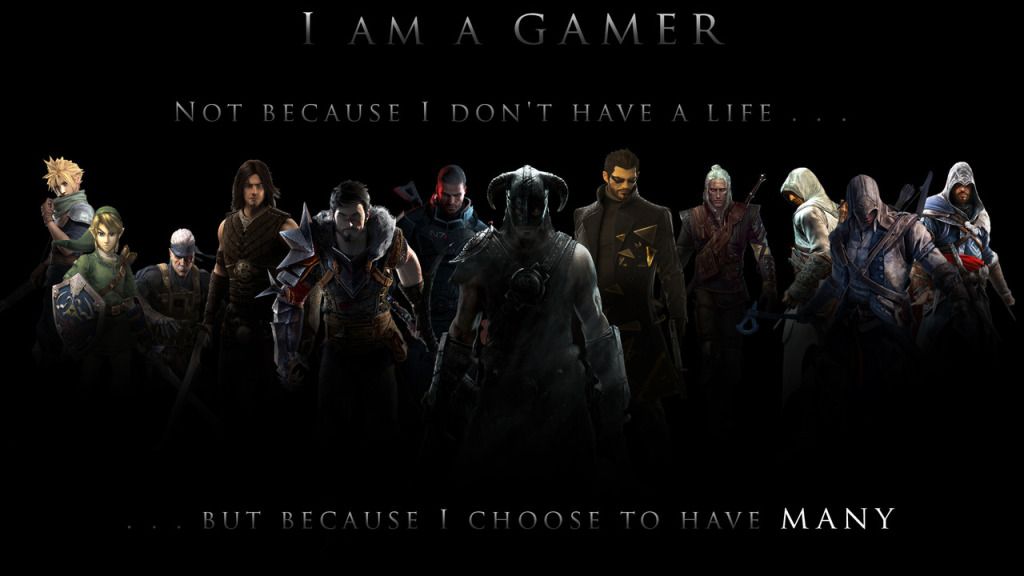My first introduction to computer games (or "video games" in a more general sense) was Ultima VII, a fantasy RPG created by Origin Systems and designed by Richard Garriott. We bought it when it came out in 1992.
 | |
| Courtesy of Wikipedia.org |
Fantasy settings usually involve magical medieval environments and RPG is short for Role-Playing Game, meaning the player pretends to be (one of) the main character(s). The player's job? You guessed it: save the world. Except that in the Ultima universe, you are the Avatar, a person summoned from your home world (our modern-day world) to the world of Britannia.
 | |
| http://natu.txt-nifty.com/natsutan/img/ultima7.jpg |
Identity
I consider gaming as a core part of my identity, much like an athlete would consider sports to be part of his or her identity. I realize that gaming does not substitute sports for physical activity, but it is a pastime for many people and provides a fictional outlet for stress, much like reading a novel.
Unfortunately, video games have a very negative reputation in the United States and I believe that reputation is unfounded. Everyone experiences stress on a frequent basis and many of us try to reduce it through video games instead of TV, books or sports. Don't misunderstand me; reading and physical activity are healthy, but they don't reduce stress to the same level for everyone. For example, I feel a need to be actively engaged in an activity (which rules out TV) in a fictional setting in order to reduce the stress and frustrations of my day.
In addition, it is easy to lose a great part of oneself when parenting small children. Young children require a lot of time and care and their needs don't wait for commercials. I sometimes find it difficult not to resent losing my personal time to their constant demands. I love doing a lot of things in quiet on my own time, including learning and playing. I have lost a great deal of that time to raising children, but I find I am a happier mother and wife when I take some downtime on occasion to lose myself in a virtual world.
I don't know the origin, but this expresses part of my feelings regarding video gaming quite well:
 |
| http://i665.photobucket.com/albums/vv18/deoxy_adi/tumblr_m8cq02uPla1qd900fo1_1280.jpg |
Many occupational or recreational possibilities (such as traveling) are greatly reduced once children are born. Even without children, our lives are too short to enjoy every opportunity available to us. I cannot be a pilot, a doctor, an architect, a software programmer, a zookeeper, a multilinguist, and a mother all in my lifetime. I don't have time to go out, save the world and earn a Nobel Peace Prize because my children need me here, teaching them, feeding them, playing with them, and tucking them in at night. In video games I can satiate some of my superhero desires while still being able to shut it off in time to read bedtime stories.
While writing this post I thought about many tangents that I would like to address such as:
- The relation between video games and violence
- A rebuttal to the insult "You play video games and live in your mother's basement"
- Why I feel a need to personally handle my children's education
For today, I will summarize by saying every person has his or her preferred method of reducing stress. For me, it involves video games.
Next up: MMORPGs
Very insightful.
ReplyDeleteI agree that - in large measure - the attempts to correlate video games with violence fall into the "correlation equals causation" trap.
For example, regarding the recent CT shootings, much ado was made about Lanza's playing video games. While that was the case, the reports glossed over many other important - and to me, more central - facts; that he became withdrawn when his dad was remarrying looms much larger in my mind as being causative, than playing video games.
In that respect, video games were symptomatic, not etiological.
One other thing that has struck me, many times, as I've played video games, is that role-playinf is something children love to do: It is a healthy - and expected - method of developing the character of a child. Why is it that adults should forgo the joys and challenges of doing what we - as children - enjoyed so much?
Immersive game play is as important an expression of one's self, as participation in a sport. They both constitute a form of recreation; and who is to say that sports are a better venue then games? Based on texts such as "Gamification by Design", and "The Art of Game Design: A book of lenses", it seems pretty clear to me that there is a quantifiable rationale for playing games.
Thank you. You've actually summarized some of my thoughts quite well and I wish more people gave video games the benefit of the doubt before declaring them the culprit of violence, especially because I believe there are often underlying issues that end up being ignored as a result.
Delete